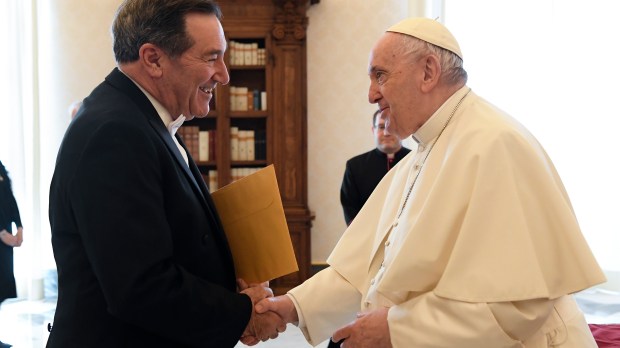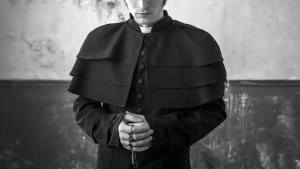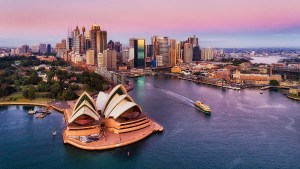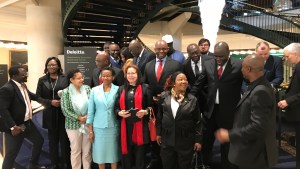The United States formally recognized the Holy See – the Vatican – on January 10, 1984, when President Ronald Reagan and Pope John Paul II agreed to the establishment of diplomatic relations.
It’s hard to imagine, on this 40th anniversary of that act, that there was a time when Washington did not formally recognize the Vatican. But, as Professor Darren Dochuk of the University of Notre Dame notes, that state of affairs had a lot to do with an anti-Catholic sentiment prevalent in American politics going back to the 19th century. In spite of that, he told Aleteia, various presidents were able to do business with the Vatican through personal representatives.
The current US ambassador to the Holy See, Joseph S. Donnelly, is pictured above.
Dochuk is the Andrew V. Tackes College Professor of History at Notre Dame and the William W. and Anna Jean Cushwa Co-Director at the University’s Cushwa Center for the Study of American Catholicism.
I assume the US had some sort of relations with the Holy See before January 10 1984. What was that like?
Prof. Darren Dochuk: Relations at the consular level were formal and substantive from the late 18th century to just after the Civil War. Early on, there was a formal relationship of the kind that would develop after 1984. And the curious part of the story, I think, happens between 1867 and 1984. And that’s really where tensions arise. There will be continued relations between the US and the Vatican, but in a more slightly informal role where presidents appoint their own personal envoys to the Vatican, ultimately still serving kind of in the role of ambassador but without some of the political weight and burdens that come with a more formal relationship, in terms of a consulate and such.
So, what happens in 1984 really is a restoration of the type of official alliance with the Vatican that occurred earlier, but nevertheless represented a pretty important turning point in at least the 20th century relationship between the US and the Vatican.
What was it that changed after the Civil War?
Dochuk: I think it had to do with questions about the Vatican’s involvement in the Civil War, support for unfriendly causes, at least as Northern Protestants saw it, including rumors of being involved in the assassination of Abraham Lincoln, all of which stirred up an anti-Catholic sentiment that was always strong, particularly in an Anglo-Protestant Unionist cause.
And so that played out in Congress’s diminishing trust in the Vatican and resulting in kind of an official separation of Washington from Vatican relations. And that really set off what would be a period of a rising anti-Catholic sentiment in the United States, and that really would be at the core of American suspicions of the Vatican, of Catholic power, and a reason why presidents throughout this period, from 1867 to 1984, would be wary of changing or making the relationship with the Vatican any more substantive and substantial.
Was there a law that prohibited formal relations, or what was it exactly?
Dochuk: Yes, I believe in 1867, there was legislation passed by Congress that did prohibit any future financial or political support of US diplomacy to the Holy See. With Ronald Reagan, one of his first steps in trying to reestablish a more formal relationship would be to rescind that law.
How did things change leading up to 1984?
Dochuk: There’s a lot of twists and turns in the mid-20th century period. You know, there were attempts by Franklin D. Roosevelt, and then Harry Truman to solidify the relationship with the Vatican. A famous case is Myron Charles Taylor, who was an industrialist who was appointed Roosevelt’s personal envoy to the Vatican during World War II and was really influential in helping guide Allied war efforts, but also peace initiatives in that region that was absolutely devastated. So he played a crucial role in solidifying Washington’s presence in Rome and shoring up that relationship.
Truman comes along and is appreciative, of course, of Taylor’s efforts, but also wary once again of formalizing it in any sense because of Protestant opposition. The 1950s, [part of] the Cold War period, is a period in which religion is going to play a more prominent kind of role in civil society. [President Dwight D.] Eisenhower, of course, famously is going to proclaim a Protestant-Catholic-Jewish America, a tri-faith America, as a way to oppose secular communism. But in the meantime, Catholics are entering the mainstream, and that is making Protestants, especially more conservative evangelical ones, all the more suspicious of any kind of relationship with the Vatican.
And so Truman, ultimately, is going to face that opposition, and the result is Taylor’s resignation and the failed attempt to place a successor in the Vatican.
That changes quite dramatically by the 1970s. And I think one of the most important changes is that Protestants themselves, especially conservative ones, begin to see Catholics, particularly conservative ones, as allies, no longer as foes. They are increasingly aligning in a fight for conservative social values. This is in, of course, response to Roe v. Wade, in response to abortion, gay rights and so forth, and so in this emerging culture wars climate of the ‘70s and ‘80s, Evangelical Protestants are looking to Catholics as friends and as allies, and in that case, seeing the Vatican not as a foe but as a potential ally in the fight for these values.
And of course, as Reagan sees it — and this is, I think, front and center in his imagination — the Vatican is an ally in the fight against communism in the Cold War fight that has once again ratcheted up in the early 1980s. And so he looks to again solidify that relationship. He travels to Vatican City, meets with Pope John Paul, and then in ‘84 formally establishes diplomatic relations. That act, where back in the ‘40s and ‘50s would have been decried by American Protestants who, you know, maintain power in American life, by the ‘80s, they’re celebrating this move – a pretty dramatic turn.
So what kind of benefits have come about in these past 40 years because of diplomatic relations?
Dochuk: Well, it has served both parties well. The Vatican sees the wealth, the influence, the authority that American Catholics have, the potential to shape the direction of the Church, even as the Church spreads its own influence and looks increasingly to the global South for its support and to populate its pews.
In terms of the US and the benefits of its relationship with the Holy See, I think it has to do more with appearance. It’s relational. It solidifies in the imagination of American Catholics a favorable relationship with their Church. It is no longer seen as in some ways oppositional or some ways challenging to the American way of life. And so, Washington’s willingness to work in this capacity with the Vatican demonstrates its support for a faith tradition and community that has meant so much increasingly at the domestic level.
And then in terms of shared policy interests, while there might be tensions, certainly, considering US involvement in particular wars or refusal to roll back nuclear armaments and so forth, these are tensions, certainly, that have existed politically between Washington and the Vatican. But by and large, I think shared concern for issues of protecting religious freedom abroad, which is dear to the hearts of not just those at the Vatican, but American Catholics and Protestants too, taking on causes such as human rights, protection of human rights, working against human trafficking, and to some degree — although this of course has raised internal tensions in the Catholic Church — matters of climate and environment.
So these are shared interests that I think have brought these two entities together and that have brought benefits, I think, to both in their attempts to shape new directions for the global community.
Have there been ways the Holy See has been able to influence any US policy?
Dochuk: One could see the Church’s effect on a consciousness raising in the American body politic. This is, again, the Vatican bringing particularly social justice concerns, raising those to the level where American Catholics especially, but citizens as a whole need to take them seriously. And I think that has been raised by ambassadors to the Vatican since 1984.
And that has been something that Washington has recognized, and I think, honored. And again, causes, policies ultimately on issues of religious freedom have, I think, been front and center. It has also been a matter of debates, be it over American attempts to forge connections with even North Korea, for instance, during the Trump administration, or to wrestle with policy decisions in the Middle East concerning Israel, for instance, which the Pope has, of course, been outspoken on. There have been, I think, moments of clear alignment that have produced a shared cause, and there have also been moments of tension that have made the Vatican critical of the US, and vice versa.
Where do diplomatic relations seem to be headed now?
Dochuk: I would anticipate more of the same. Obviously with [President Joseph R.] Biden, with his Catholic faith, this has been an important relationship for him to maintain, even as his own party’s politics — in particular, social issues — perhaps, don’t line up entirely with the Vatican at the same time. I think there has been plenty of conversation between Washington and the Vatican on matters of climate, on matters of environmental justice and land care. That has been an area in which this relationship has remained strong and perhaps has gotten even stronger.
Regardless of what happens in the next election, whether it’s Biden or someone from the Republican Party, I think they’re all going to bring a set of priorities rooted in their own constituencies that are going to ultimately work to strengthen or at least maintain a close relationship with the Vatican. Should a Republican get into the presidency, you can assume that there’s going to be more efforts to shore up protection of religious freedom, to make sure that the fight for religious freedom is front and center in both domestic and international policy for the US, combating what many conservatives see as a war on faith, secularization of society. And this is something, of course, that the Pope expresses concern about as well.
So, all that’s to say, I think the relationship will continue as it is, if not even getting stronger as we move forward. Religion today, more than 10 years ago, 20 years ago, is more front and center in both domestic and global political circumstances that ensure the need, at least, for a close relationship between Washington and Rome.




